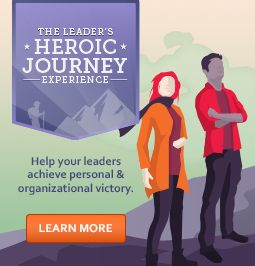Lead Positive in the News!
Since we launched Lead Positive: What Highly Effective Leaders See, Say, and Do in March, I have been working hard to get the message out. In the past month, I have been fortunate enough to have been featured in a number of esteemed outlets, which I’d like to share with you today. Click on the...
ReadLeaders Build Trust and Stronger Relationships with Gratitude
Did you know that gratitude may be the key to happiness? Numerous studies have shown strong links between gratitude and increased positive emotions. For me, gratitude is the most rewarding of all the positive emotions because it acknowledges a major victory with humility. That makes it a key to leadership effectiveness as well. This article...
ReadBe in the Arena and Live it Every Day (More Tips from Doug Conant)
Today, I published Part 2 of my Lead Positive Profile of Doug Conant, Founder & CEO of ConantLeadership. Doug is also a New York Times bestselling author, the former CEO of Campbell Soup Company, Chairman of Avon Products and Chairman of The Kellogg Executive Leadership Institute. In the profile, Doug shares how he learned to communicate effectively...
ReadHow to Leave a Lasting Impact (Tips from Doug Conant)
How can you leave a lasting positive impact on the people in your circle of influence? I have been interviewing highly effective leaders on my Psychology Today blog to find out just that. Today, I published Part 1 of my Lead Positive Profile of Doug Conant, Founder & CEO of ConantLeadership. Doug is also a New...
ReadGoing From Setback to Bounce Back
Failing fast. Sounds good in theory but in practice it can feel very wrong—and be very painful. For most of our lives we’ve been told that failure is not an option. So despite the obvious benefits of experimentation, bouncing back from failure—much less bouncing back “fast”—remains a lofty ideal. And the challenges of failing fast...
ReadEnergetic Pauses: How a Focus on the Present Relieves Stress and Increases Productivity
“He who can no longer pause to wonder and stand rapt in awe is as good as dead, his eyes are closed.” – Albert Einstein Too much to do and not enough time—this is the modern leader’s dilemma. Our daily routines stress us out because it feels like there’s no time to breathe—much less think—in...
ReadYour Lead Positive Hero’s Journey (Part 2 of 2)
(Editor’s Note: For part 1 of this blog post, please go here) Your Hero’s Journey is the leadership story of what lies ahead in the pursuit of your goals. It is the story of the future you seek come true—your leadership vision realized. Last week, I discussed the first three phases of the Hero’s Journey: The Call,...
ReadYour Lead Positive Hero’s Journey (Part 1 of 2)
(Editor’s Note: For part 2 of this blog post, please go here) A story well told transports the listener to a different time, place and plane. It captivates emotions and provides an exciting trajectory of experiences full of hope, struggle, uncertainty and surprise! Stories show us how to live life. Stories help us lead. Leadership stories...
ReadRough Weather Makes Good Timber or How Asset-Based Thinking Came To Be
If my brother Jim had not died when he was 22 of a usually easy-to-survive illness called mononucleosis, I am sure I never would have written 9 books. I know I would not have founded The Stress Center at Saint Louis University. I certainly would not have dedicated my career to discovering what it takes...
ReadYour Greatest Weapon Against Stress
One of the main culprits wreaking havoc on our wellbeing and productivity is stress. Stress paralyzes by shifting us in to deficit-based thinking mode and holding us back from seeing and acting on the opportunities in front of us. For millennia, negative information has weighed more heavily on the brain to ensure survival. In neuroscience,...
Read

